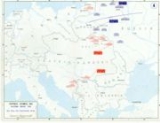
Imperial Russian Army during the Napoleonic Wars
Overview
Armed forces
The armed forces of a country are its government-sponsored defense, fighting forces, and organizations. They exist to further the foreign and domestic policies of their governing body, and to defend that body and the nation it represents from external aggressors. In some countries paramilitary...
of the Russian Empire
Russian Empire
The Russian Empire was a state that existed from 1721 until the Russian Revolution of 1917. It was the successor to the Tsardom of Russia and the predecessor of the Soviet Union...
, active from around 1721 to the Russian Revolution of 1917. In the early 1850s, the Russian army consisted of around 938,731 regular soldiers and 245,850 irregulars (mostly Cossacks). Until the time of military reform of Dmitry Milyutin
Dmitry Milyutin
Count Dmitry Alekseyevich Milyutin was Minister of War and the last Field Marshal of Imperial Russia...
in 1874 Russian army had no barracks. Almost half a million soldiers were deployed in primitive dugouts and huts or private homes.
Russian tsars before Peter maintained professional hereditary musketeer corps (streltsy
Streltsy
Streltsy were the units of Russian guardsmen in the 16th - early 18th centuries, armed with firearms. They are also collectively known as Marksman Troops .- Origins and organization :...
in Russian).
Quotations
The durian — neither Wallace or Darwin agreed on it. Darwin said "may your worst enemies be forced to feed on it." Wallace cried "it's delicious." Darwin replied "I'm suspicious", For the flavour is scented Like papaya fermented After a fruit-eating bat has pee'd on it.![]()
Horticulture, 1973 . Refers to Alfred Wallace, who cited an enthusiastic long list of durian recipes in his book.

